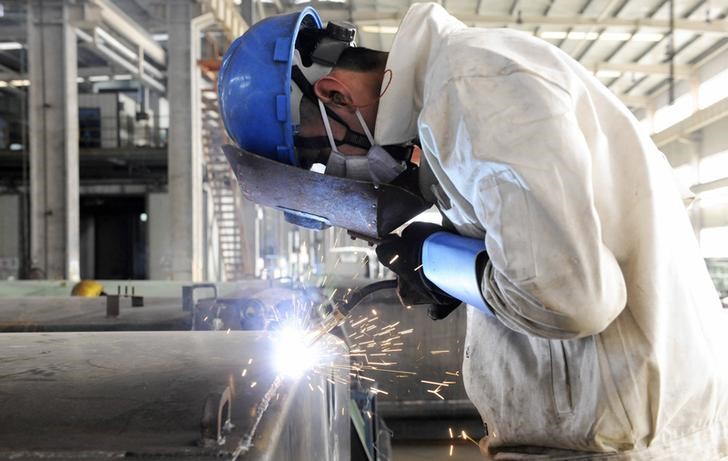By Jonathan Cable and Michael Connor
LONDON/NEW YORK (Reuters) - U.S. and euro zone business growth slowed in May while China's factory sector contracted again, reinforcing the need for major central banks to continue supporting economic growth.
The U.S. Federal Reserve is seen unlikely to tighten monetary policy in June since the world's biggest economy barely grew at the start of the year.
Growth in euro zone business activity also weakened in May, just two months after the European Central Bank launched a 1-trillion-euro stimulus program, and an absence of inflation pressures suggested Asian authorities could inject more stimulus if needed.
"The May (Purchasing Managers' Index) surveys were broadly disappointing although nothing terribly bad," said Richard Kelly, head of global strategy at TD Securities.
"There is no question the ECB is going to continue with quantitative easing up until September 2016. China is just starting the amount of additional liquidity and stimulus that will be needed to safely rebalance the economy," he said.
^^^^^^^^^^^^^^^^^^^^^^^^^^^^^^^^^^^^^^^^^^^^^^^^^^^^^^For a euro zone graphic: http://link.reuters.com/cuh64s
Global manufacturing PMI graphic: http://link.reuters.com/nyz22t
^^^^^^^^^^^^^^^^^^^^^^^^^^^^^^^^^^^^^^^^^^^^^^^^^^^^^^^^^>
U.S. FACTORY GROWTH SLOWS FOR SECOND MONTH
Growth in the U.S. manufacturing sector slowed for a second straight month during May, with new orders rising at their slowest pace since January 2014, private data vendor Markit said on Thursday.
The preliminary U.S. Manufacturing Purchasing Managers' Index fell to 53.8 in May from the final April reading of 54.1, although the sector's jobs growth picked up this month from April.
Economists polled by Reuters had forecast the May reading would be 54.5. A figure above 50 indicates expansion in the sector.
The index's flash output component fell to 55 from the final April reading of 55.3, and was the lowest since December 2014. The flash reading of the index measuring new orders also weakened in May, to 54.2 from April's final 55.3.
"The weaker order book trend doesn't appear to have affected hiring, at least not yet, with job creation picking up in May. However, unless production growth revives, there is a worry that payroll growth will slow as companies seek to boost productivity," said Chris Williamson, Markit's chief economist.
EURO ZONE BUSINESS WEAKER BUT EMPLOYMENT UP
Euro zone business growth was weaker than expected this month but firms increased staffing levels at the fastest rate in four years, according to Markit.
Any signs of growth, alongside the survey showing firms cut prices only marginally after reducing them for over three years, will cheer European Central Bank policymakers coming just two months after they launched a trillion-euro stimulus programme.
"There will be a lot of people disappointed that we have an easing in growth for the second month but it needs to be put in context that it is a reasonable number," said Markit's Chris Williamson. "The broader picture is that the recovery remains on track - it's doing rather well."
Markit's Composite Flash Purchasing Managers' Index for the euro zone, based on surveys of thousands of companies and seen as a good growth indicator, fell to 53.4 from 53.9, missing the 53.8 predicted by a Reuters poll. However, firms stepped up recruitment, with the employment sub-index at 52.3, its highest reading since May 2011.
Demand from abroad for euro zone goods soared as customers took advantage of a weaker euro's making the products cheaper. The manufacturing new export orders index jumped to a 13-month high of 53.0 from 52.3.
Shares on major world markets hovered near all-time highs on Thursday. The MSCI World equity index (MIWD00000PUS) was up as much as 1.4 percent before trimming its gain to 0.4 percent. [MKTS/GLOB]
CRACKS IN CHINA
Chinese activity contracted for a third straight month as domestic and export orders shrank, adding to views Beijing will have to roll out its most aggressive stimulus measures since the global financial crisis to avert a sharper slowdown.
The flash HSBC/Markit PMI for China fell to 49.1 in May, weaker than an expected 49.3 and marking the fifth contraction in activity in six months.
"The subdued flash PMI print suggests there is no clear sign of near-term stabilisation in (China's) economy. Risks to the outlook remain to the downside," Barclays (LONDON:BARC) economist Shengzu Wang said.
Beijing has already cut interest rates three times in six months and economists believe it will have to ease further as economic growth threatens to slow below the 7-percent pace of the first quarter.
Analysts at Nomura saw China's growth slowing to 6.6 percent year-on-year in the second quarter, before edging up to 6.8 percent in the second half of the year.
However, Japanese manufacturing activity rebounded modestly in May as output and new orders picked up, suggesting a much-needed improvement in demand at home and abroad.
The Markit/JMMA flash Japan Manufacturing Purchasing Managers Index rose to a seasonally adjusted 50.9 in May from a final 49.9 in April. The index rose above the 50 threshold that separates contraction from expansion for the first time in two months.
Other data showed Japan's economy expanded in January-March at the fastest pace in a year. But much of that growth came from inventories as goods piled up on factory floors, and private consumption, housing investment and exports all rose, though at a feeble pace.
Still, subdued input and output prices suggested inflation remained stubbornly low, adding to expectations the Bank of Japan will expand its already massive monetary stimulus programme later this year.
